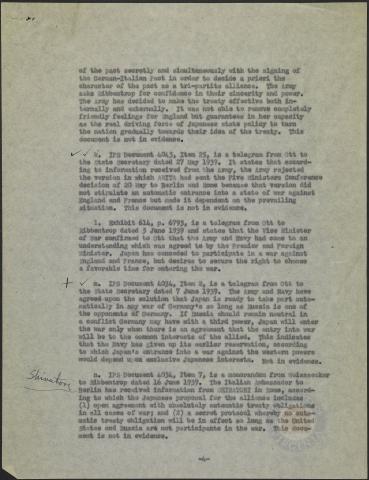
Page 4
| Parent | Japanese Negotiations with Germany and ITAGAKI's attitude in regard to them |
|---|---|
| Date | 6 October 1946 |
| Language | English |
| Collection | Tavenner Papers & IMTFE Official Records |
| Box | Box 3 |
| Folder | General Reports and Memoranda October 1946 |
| Repository | University of Virginia Law Library |
Of the pact secretly and simultaneously with the signing of the German-Italian Pact in order to decide a priori the character of the pact as a tri-partite alliance. The Army asks Ribbentrop for confidence in their sincerity and power. The Army has decided to make the treaty effective both internally and externally. It was not able to remove completely friendly feelings for England but guarantees in her capacity as the real driving force of Japanese state policy to turn the nation gradually towards their idea of the treaty. This document is not in evidence.
k. IPS Document 4043, Item 25, is a telegram from Ott to the State Secretary dated 27 May 1939. It states that according to information received from the Army, the Army rejected the version in which ARITA had sent the Five Ministers Conference decision of 20 May to Berlin and Rome because that version did not stipulate an automatic entrance into a state of war against England and France but made it dependent on the prevailing situation. This document is not in evidence.
l. Exhibit 614, p. 6793, is a telegram from Ott to Ribbentrop dated 5 June 1939 and states that he Vice Minister of War confirmed to Ott that the Army and Navy had come to an understanding which was agreed to by the Premier and Foreign Minister. Japan has conceded to participate in a war against England and France, but desires to secure the right to choose a favorable time for entering the war.
m. IPS Document 4034, Item 2, is a telegram from Ott to the State Secretary dated 7 June 1939. The Army and Navy have agreed upon the solution that Japan is ready to take part automatically in any war of German’s so long as Russia is one of the opponents of Germany. If Russia should remain neutral in a conflict Germany may have a third power, Japan will enter the war only when there is an agreement that the entry into war will be to the common interests of the allied. This indicates that the Navy has given up its earlier reservation, according to which Japan’s entrance into a war against the western powers would depend upon exclusive Japanese interests. Not in evidence.
n. IPS Document 4034, Item 7, is a memorandum from Weiszaecker to Ribbentrop dated 16 June 1939. The Italian Ambassador to Berlin has received information from SHIRATORI in Rome, according to which the Japanese proposal for the alliance includes (1) open agreement with absolutely automatic treaty obligations in all cases of war; and (2) a secret protocol whereby no automatic treaty obligation will be in effect so long as the United States and Russia are not participants in the war. This document is not in evidence.
-4-
